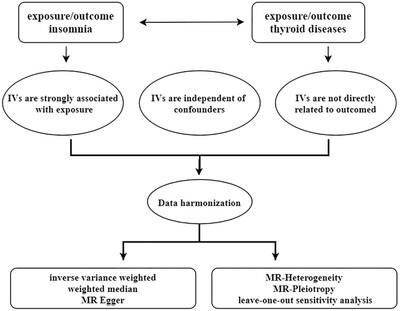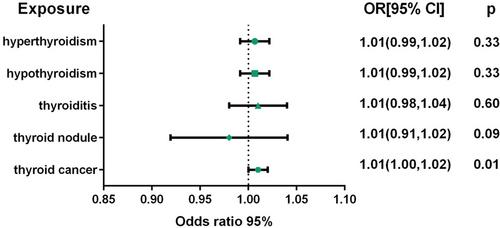Causal relationship between insomnia and thyroid disease: A bidirectional Mendelian randomization study
Abstract
Objective
Some correlations between thyroid disorders and insomnia have been found in previous studies; however, the causal relationship between them is unclear. The aim of this study was to investigate the causal relationship between insomnia and five thyroid disorders (hyperthyroidism, hypothyroidism, thyroiditis, thyroid nodules, and thyroid cancer).
Methods
We assessed the causal relationship between insomnia and thyroid disorders using inverse variance weighted, weighted median, and Mendelian randomization (MR)-Egger analyses in MR analyses and then used inverse MR analyses to assess the causal relationship between thyroid disorders and insomnia.
Results
MR analysis showed that insomnia did not increase the risk of hyperthyroidism, hypothyroidism, thyroiditis, thyroid nodules, and thyroid cancer. However, reverse MR analysis showed that thyroid cancer increased the risk of insomnia (OR = 1.01, 95%CI: 1.00–1.02, p = .01), and the other four thyroid disorders had no direct causal relationship with insomnia. Sensitivity analyses indicated that the results were robust and no pleiotropy or heterogeneity was detected.
Conclusion
This study did not find evidence of a bidirectional causal relationship between genetically predicted insomnia and hyperthyroidism, hypothyroidism, thyroiditis, and thyroid nodules. However, we found that although insomnia does not increase the risk of thyroid cancer, thyroid cancer does increase the risk of insomnia.



 求助内容:
求助内容: 应助结果提醒方式:
应助结果提醒方式:


